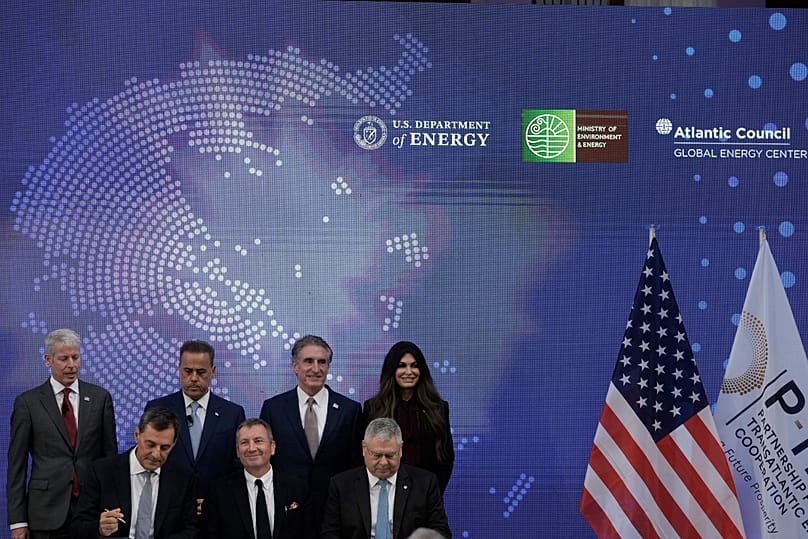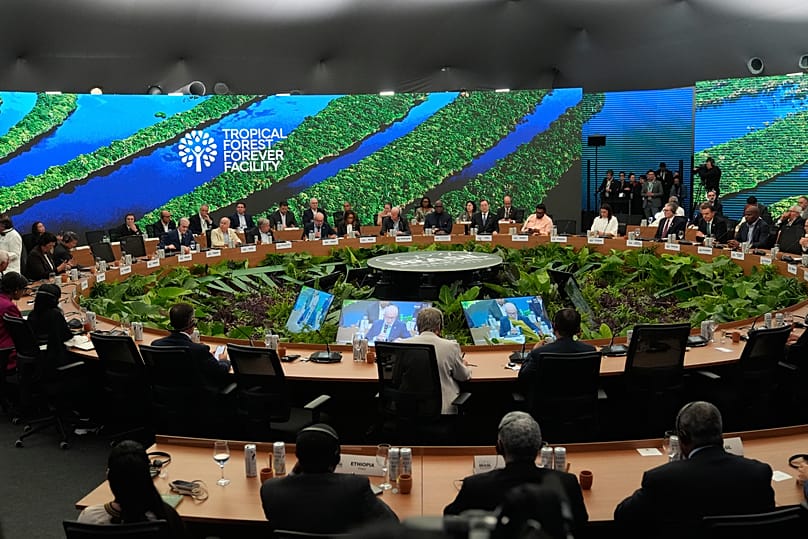Speaking to Euronews, US Energy Secretary Chris Wright indicated Washington's willingness to have a long-term energy presence in Europe and highlighted Greece's role as a key hub.
The United States will maintain long-term energy cooperation with European allies as the world's top LNG producer works to displace Russian gas supplies, US Energy Secretary Chris Wright told Euronews during talks in Greece aimed at accelerating Europe's transition away from Moscow's energy dominance.
Wright and Interior Secretary Doug Burgum joined over 80 Washington officials, EU energy ministers and top LNG executives for talks in Greece hosted by the Atlantic Council, a Washington-based think tank.
“The United States alone could displace all the Russian gas in Europe with what we’re building,” said Burgum, signalling strong US intent to fill the void left by Russian supply cuts.
The push comes as US President Donald Trump continues to leverage Washington's position as the world’s top LNG exporter, tying energy supply to trade relations with Europe and efforts to end Russia's war in Ukraine.
Transatlantic energy cooperation
Speaking to Euronews, Wright indicated Washington's willingness to have a long-term energy presence in Europe and highlighted Greece's role as a key hub.
"I think the support is quite sustainable, you know, we have been allies with European nations throughout the history of the United States. Our resources are vast, our desire to develop cooperation, both economic and national security is strong. Yes, the United States will be here for the long term," he said.
With Europe already the largest market for LNG from the US, focus has shifted to the so-called Vertical Corridor, a new north-south gas route linking Greece to Bulgaria, Romania and Ukraine.
Export terminals near Athens and in northern Greece will play a key role.
“Greece is blessed with a very unique geographic location and we are the natural entry point for American liquefied natural gas into Europe,” Greek Prime Minister Kyriakos Mitsotakis said late on Wednesday.
"We see our role largely as a long-term supplier, largely as a long-term supplier," Wright told Euronews.
"The United States' gas production is more than double Russia's gas production and ours is growing rapidly. And our export capacity is expanding even faster than our natural gas production," he pointed out.
"We believe that nations that are well supplied with energy have greater economic opportunities, greater prosperity, and having these cross-border, trans-oceanic energy partnerships leads to long-term rigid relationships and promotes peace in the world."
Greece's geostrategic role
Greece has recently become a gateway for natural gas and renewable energy in southeastern Europe.
Projects such as the Alexandroupolis LNG terminal and connections with the Balkans have demonstrated Greece's strategic importance.
"Greece is an excellent partner," Wright said. "Greece has historically been a shipping powerhouse, as 20% of global shipping and over a third of all LNG, liquefied natural gas, shipments are made by Greek companies."
"But when Russia dominated as an energy supplier in Europe, Greece was the end of the line, it was just a node at the end of the energy transmission system. Now we have seen a completely different role for Greece," he stated.
"Greece is now the gateway, from outside the United States to American energy as it flows into Europe. I think it's huge economic benefits for Greece, and it's great for the United States to have such a longtime ally and partner like Greece playing that role as a gateway for American energy to Europe."
Wright also stressed the importance of US investment in Greece and Cyprus's energy sectors and how that contributes to geopolitical stability in the region.
"The pipeline infrastructure that Greece is building and interconnecting with all the neighboring nations is uniting this region of the world. They are very independent countries with long different histories, but perhaps not as much economic integration across the region," he told Euronews.
"This natural gas corridor, the Eastern Corridor and the Greek ports I think will bring the nations together. It will not just be about gas. It will be about increased trade, increased cooperation, increased economic growth."
Climate change and talks in Brazil
Meanwhile, Trump has not sent any senior officials to the United Nations COP30 climate summit taking place in Belém in Brazil's Amazon rainforest.
This has raised concerns that the absence of the US, which has at times played a key role in persuading China to curb carbon emissions and in securing finance for poor countries, could signal a broader rollback of climate politics.
Wright indicated that he would be unlikely to attend next year’s event either.
"Look, I've been working, studying, writing, reading about climate change for over 20 years, I've been very active in this debate and dialogue," he said.
"First of all, I will say what has been the biggest factor in decarbonisation. By far, it's the development of natural gas. The United States has reduced greenhouse gas emissions more than the next seven nations combined," Wright added.
"This was simply the economic displacement of natural gas in the energy sector. The replacement of coal," Write pointed out.
"Coal is still critical. It's the third largest source of electricity, but it used to be our dominant source. Today, it's natural gas. It's also cleaner burning, so you have less air pollutants as well as greenhouse gas emissions," he said.
"I don't even know when global greenhouse gas emissions will peak. We still have a billion people living rich, wonderful lives and seven billion people who want to. So I think we're going to see many, many decades of growth in energy production.
"Climate change is a real thing, but it has simply been grossly overstated for political purposes. I think it's very unfortunate," Wright concluded.













